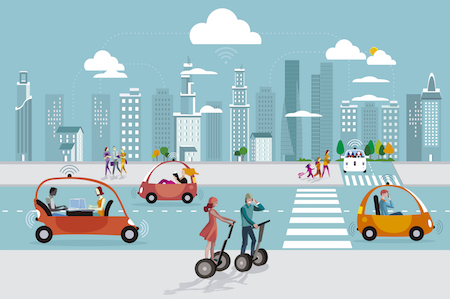28 September 2017
Ready for the Mobility Forum “Assises de la mobilité”


Thirty-five years after the Framework Law on Internal Transports (LOTI), the “Assises de la Mobilité” started on September 18th under the patronage of Elisabeth Bornes, French Transport Minister. This important public forum, which will contribute “to preparing the framework for mobility policies”, should aim to underline the major challenges of tomorrow’s mobility and ensure that the law will be a complete success. Thus, it is crucial to anticipate not only the needs and requirements to be satisfied but also the technologies that will be available. Considering that transport infrastructures represent long-term investments, a law with too little imagination might come off the road.
Tomorrow’s mobility should continue to respond to an old fundamental issue: the previous LOTI law stated in 1982 that the right to transport should allow each user “to move in reasonable access conditions in terms of price and quality as well as cost for consumers”. The French demographic growth and the evolution of individual displacements will lead to an increase in the mobility demand in the coming years. Meeting this demand in an affordable way will therefore be key. The economic dimension is still particularly salient, as the French national Institute for statistical and economic studies (INSEE) evaluates that 3 million households are still experimenting economic difficulties to get around.
Mobility’s challenges are increasing…
Moreover, new issues have arisen since the LOTI law. In particular, mobility has to face the challenges of public health and climate change. Air pollution caused by transport is evaluated to be at the origin of 40 000 premature deaths and represents a cost estimated between 20 and 30 billion euros per year for the French population. The transport sector also accounts for almost 40% of greenhouse gas emissions, and is the most emitting sector in France. Thus, the success of the new mobility policies will be evaluated based on those new indicators.
… but so are new technologies!
To address those challenges, new technological or societal solutions already came out or will emerge. First, electric vehicles represent the best alternative to thermal motors, as they reduce CO2 emissions and improve air quality. But it would be unfair to reduce tomorrow’s mobility to this single technology. The progressive digitalization of the transport sector will be disruptive for uses and business models. The availability of “autonomous” cars, announced for the next decade, will probably increase car-sharing. Those evolutions will be able to revolutionize completely, not only the transport sector, but also urban planning. It is crucial to understand that tomorrow’s mobility will be conditioned by the transport’s supply. Thus, a preliminary work on what transport technologies could emerge in 10 or 15 years seems to be an obligatory prerequisite to the new draft framework law on mobility. This work should be done at the European level, as mobility will not stop at national borders.
Find out more
02 June 2020
“Long live Europe”: it’s time for Europe!
25 February 2020
Brexit: love last 47 years


About us
The Union of the French Electricity Industry is the trade association of the French electricity sector. We bring together companies from the whole value chain of the electricity industry.
Find out more









